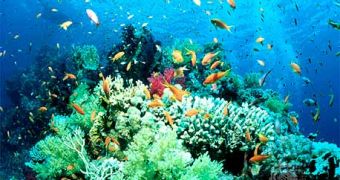Coral reefs are home to loads of plant and animal species. What's more, coastal communities that mainly rely on fishing in order to make a living would probably not be able to survive without them.
A new study set to be published in the journal Environmental Research Letter on July 3 shows that, unless human society drastically reduces the amount of carbon dioxide emissions it releases into the atmosphere, it won't be long until coral reefs worldwide are wiped out.
Researchers say that, by the end of this century, coral reefs will be surrounded by oceanic waters whose chemistry badly damages them.
These noteworthy changes in the chemical make-up of our planetary oceans will be caused by air and water pollution, global warming and overfishing.
As explained on several occasions, air pollution damages oceans because, sooner or later, chemical compounds floating about in the atmosphere are absorbed by water sources.
Whenever oceans and seas absorb a tad too much carbon dioxide, their acidity increases.
This process, which scientists refer to as ocean acidification, affects virtually all aquatic plant and animal species.
“Our results show that if we continue on our current emissions path, by the end of the century there will be no water left in the ocean with the chemical properties that have supported coral reef growth in the past,” researcher Katharine Ricke explained, as cited by Science News.
“We can't say with 100% certainty that all shallow-water coral reefs will die, but it is a pretty good bet,” she went on to argue.
The researchers demand that high officials roll out measures meant to reduce the ecological footprint of their countries as soon as possible.
“To save coral reefs, we need to transform our energy system into one that does not use the atmosphere and oceans as waste dumps for carbon dioxide pollution.
“The decisions we make in the next years and decades are likely to determine whether or not coral reefs survive the rest of this century,” Ken Caldeira stressed.

 14 DAY TRIAL //
14 DAY TRIAL //